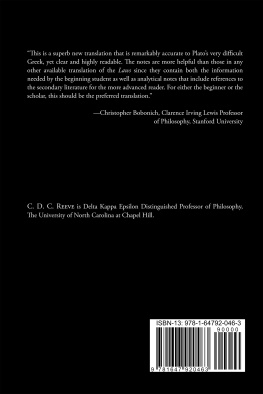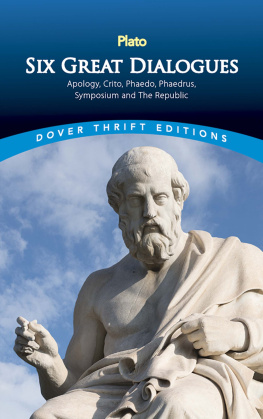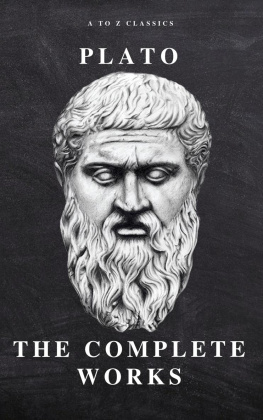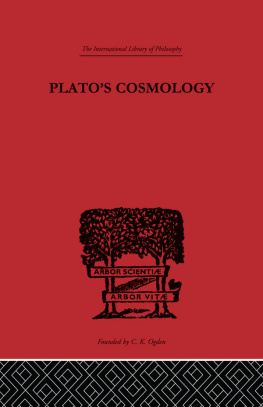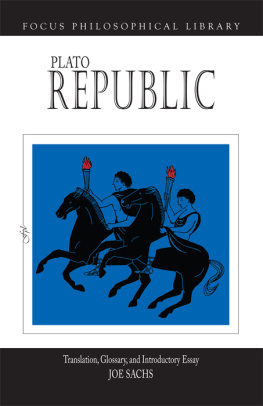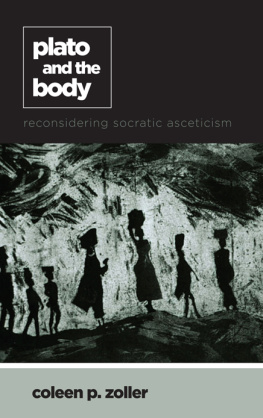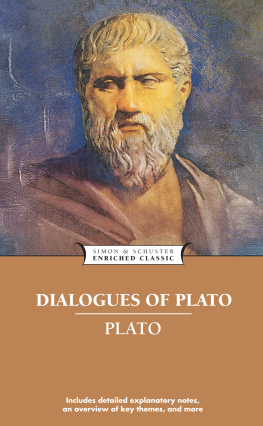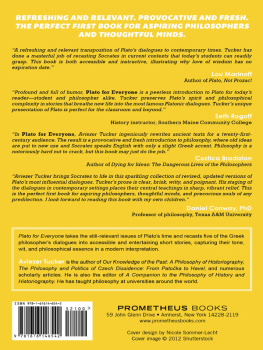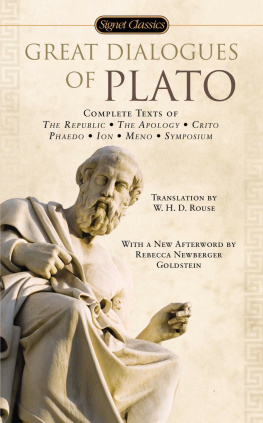Plato - Phaedo
Here you can read online Plato - Phaedo full text of the book (entire story) in english for free. Download pdf and epub, get meaning, cover and reviews about this ebook. genre: Science. Description of the work, (preface) as well as reviews are available. Best literature library LitArk.com created for fans of good reading and offers a wide selection of genres:
Romance novel
Science fiction
Adventure
Detective
Science
History
Home and family
Prose
Art
Politics
Computer
Non-fiction
Religion
Business
Children
Humor
Choose a favorite category and find really read worthwhile books. Enjoy immersion in the world of imagination, feel the emotions of the characters or learn something new for yourself, make an fascinating discovery.
Phaedo: summary, description and annotation
We offer to read an annotation, description, summary or preface (depends on what the author of the book "Phaedo" wrote himself). If you haven't found the necessary information about the book — write in the comments, we will try to find it.
Phaedo — read online for free the complete book (whole text) full work
Below is the text of the book, divided by pages. System saving the place of the last page read, allows you to conveniently read the book "Phaedo" online for free, without having to search again every time where you left off. Put a bookmark, and you can go to the page where you finished reading at any time.
Font size:
Interval:
Bookmark:
The Project Gutenberg EBook of Phaedo, by Plato
This eBook is for the use of anyone anywhere at no cost and with
almost no restrictions whatsoever. You may copy it, give it away or
re-use it under the terms of the Project Gutenberg License included
with this eBook or online at www.gutenberg.org
Title: Phaedo
The Last Hours Of Socrates
Author: Plato
Translator: Benjamin Jowett
Release Date: October 29, 2008 [EBook #1658]
Language: English
*** START OF THIS PROJECT GUTENBERG EBOOK PHAEDO ***
Produced by Sue Asscher, and David Widger
INTRODUCTION. PHAEDO |
After an interval of some months or years, and at Phlius, a town of Peloponnesus, the tale of the last hours of Socrates is narrated to Echecrates and other Phliasians by Phaedo the 'beloved disciple.' The Dialogue necessarily takes the form of a narrative, because Socrates has to be described acting as well as speaking. The minutest particulars of the event are interesting to distant friends, and the narrator has an equal interest in them.
During the voyage of the sacred ship to and from Delos, which has occupied thirty days, the execution of Socrates has been deferred. (Compare Xen. Mem.) The time has been passed by him in conversation with a select company of disciples. But now the holy season is over, and the disciples meet earlier than usual in order that they may converse with Socrates for the last time. Those who were present, and those who might have been expected to be present, are mentioned by name. There are Simmias and Cebes (Crito), two disciples of Philolaus whom Socrates 'by his enchantments has attracted from Thebes' (Mem.), Crito the aged friend, the attendant of the prison, who is as good as a friendthese take part in the conversation. There are present also, Hermogenes, from whom Xenophon derived his information about the trial of Socrates (Mem.), the 'madman' Apollodorus (Symp.), Euclid and Terpsion from Megara (compare Theaet.), Ctesippus, Antisthenes, Menexenus, and some other less-known members of the Socratic circle, all of whom are silent auditors. Aristippus, Cleombrotus, and Plato are noted as absent. Almost as soon as the friends of Socrates enter the prison Xanthippe and her children are sent home in the care of one of Crito's servants. Socrates himself has just been released from chains, and is led by this circumstance to make the natural remark that 'pleasure follows pain.' (Observe that Plato is preparing the way for his doctrine of the alternation of opposites.) 'Aesop would have represented them in a fable as a two-headed creature of the gods.' The mention of Aesop reminds Cebes of a question which had been asked by Evenus the poet (compare Apol.): 'Why Socrates, who was not a poet, while in prison had been putting Aesop into verse?''Because several times in his life he had been warned in dreams that he should practise music; and as he was about to die and was not certain of what was meant, he wished to fulfil the admonition in the letter as well as in the spirit, by writing verses as well as by cultivating philosophy. Tell this to Evenus; and say that I would have him follow me in death.' 'He is not at all the sort of man to comply with your request, Socrates.' 'Why, is he not a philosopher?' 'Yes.' 'Then he will be willing to die, although he will not take his own life, for that is held to be unlawful.'
Cebes asks why suicide is thought not to be right, if death is to be accounted a good? Well, (1) according to one explanation, because man is a prisoner, who must not open the door of his prison and run awaythis is the truth in a 'mystery.' Or (2) rather, because he is not his own property, but a possession of the gods, and has no right to make away with that which does not belong to him. But why, asks Cebes, if he is a possession of the gods, should he wish to die and leave them? For he is under their protection; and surely he cannot take better care of himself than they take of him. Simmias explains that Cebes is really referring to Socrates, whom they think too unmoved at the prospect of leaving the gods and his friends. Socrates answers that he is going to other gods who are wise and good, and perhaps to better friends; and he professes that he is ready to defend himself against the charge of Cebes. The company shall be his judges, and he hopes that he will be more successful in convincing them than he had been in convincing the court.
The philosopher desires deathwhich the wicked world will insinuate that he also deserves: and perhaps he does, but not in any sense which they are capable of understanding. Enough of them: the real question is, What is the nature of that death which he desires? Death is the separation of soul and bodyand the philosopher desires such a separation. He would like to be freed from the dominion of bodily pleasures and of the senses, which are always perturbing his mental vision. He wants to get rid of eyes and ears, and with the light of the mind only to behold the light of truth. All the evils and impurities and necessities of men come from the body. And death separates him from these corruptions, which in life he cannot wholly lay aside. Why then should he repine when the hour of separation arrives? Why, if he is dead while he lives, should he fear that other death, through which alone he can behold wisdom in her purity?
Besides, the philosopher has notions of good and evil unlike those of other men. For they are courageous because they are afraid of greater dangers, and temperate because they desire greater pleasures. But he disdains this balancing of pleasures and pains, which is the exchange of commerce and not of virtue. All the virtues, including wisdom, are regarded by him only as purifications of the soul. And this was the meaning of the founders of the mysteries when they said, 'Many are the wand-bearers but few are the mystics.' (Compare Matt. xxii.: 'Many are called but few are chosen.') And in the hope that he is one of these mystics, Socrates is now departing. This is his answer to any one who charges him with indifference at the prospect of leaving the gods and his friends.
Still, a fear is expressed that the soul upon leaving the body may vanish away like smoke or air. Socrates in answer appeals first of all to the old Orphic tradition that the souls of the dead are in the world below, and that the living come from them. This he attempts to found on a philosophical assumption that all oppositese.g. less, greater; weaker, stronger; sleeping, waking; life, deathare generated out of each other. Nor can the process of generation be only a passage from living to dying, for then all would end in death. The perpetual sleeper (Endymion) would be no longer distinguished from the rest of mankind. The circle of nature is not complete unless the living come from the dead as well as pass to them.
The Platonic doctrine of reminiscence is then adduced as a confirmation of the pre-existence of the soul. Some proofs of this doctrine are demanded. One proof given is the same as that of the Meno, and is derived from the latent knowledge of mathematics, which may be elicited from an unlearned person when a diagram is presented to him. Again, there is a power of association, which from seeing Simmias may remember Cebes, or from seeing a picture of Simmias may remember Simmias. The lyre may recall the player of the lyre, and equal pieces of wood or stone may be associated with the higher notion of absolute equality. But here observe that material equalities fall short of the conception of absolute equality with which they are compared, and which is the measure of them. And the measure or standard must be prior to that which is measured, the idea of equality prior to the visible equals. And if prior to them, then prior also to the perceptions of the senses which recall them, and therefore either given before birth or at birth. But all men have not this knowledge, nor have any without a process of reminiscence; which is a proof that it is not innate or given at birth, unless indeed it was given and taken away at the same instant. But if not given to men in birth, it must have been given before birththis is the only alternative which remains. And if we had ideas in a former state, then our souls must have existed and must have had intelligence in a former state. The pre-existence of the soul stands or falls with the doctrine of ideas.
Font size:
Interval:
Bookmark:
Similar books «Phaedo»
Look at similar books to Phaedo. We have selected literature similar in name and meaning in the hope of providing readers with more options to find new, interesting, not yet read works.
Discussion, reviews of the book Phaedo and just readers' own opinions. Leave your comments, write what you think about the work, its meaning or the main characters. Specify what exactly you liked and what you didn't like, and why you think so.


